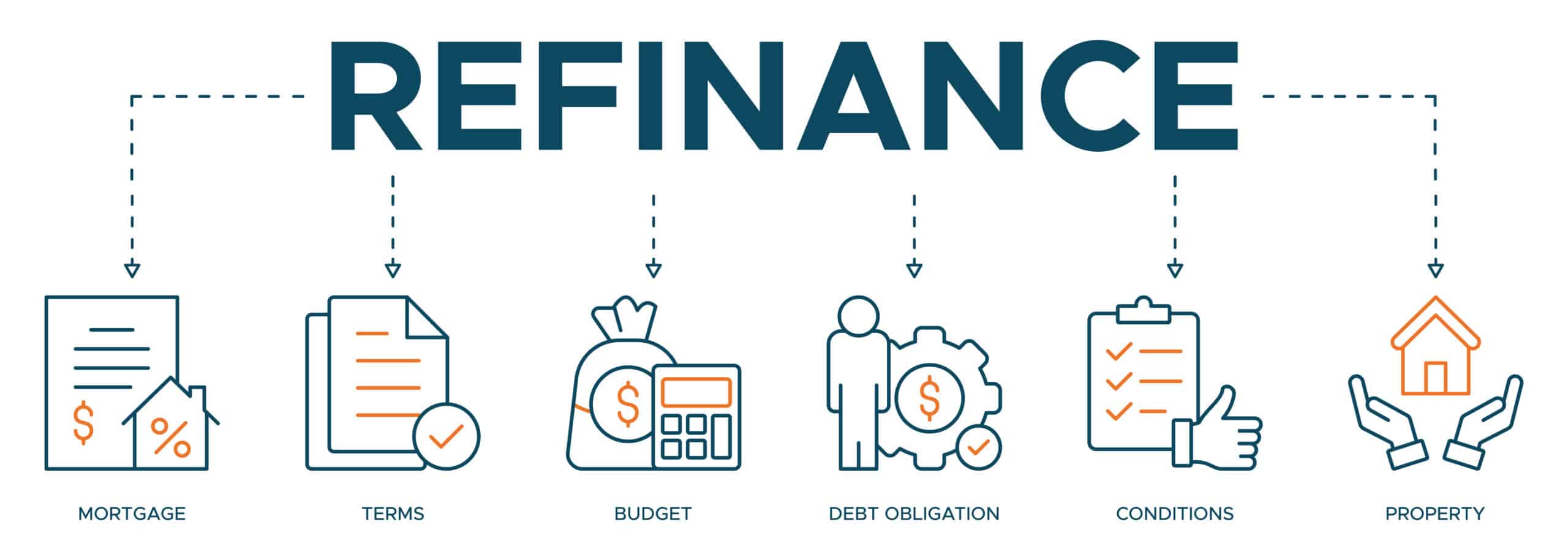
7 Things to Consider When Refinancing a Mortgage
Refinancing your mortgage can feel intimidating, especially if you’re unsure where to start. With so many options, fees, and financial implications, it’s easy to feel overwhelmed. But with the right guidance, refinancing can be a strategic move to lower your monthly payments, pay off your mortgage sooner, or even access extra cash for other financial goals.
In this Money Chat, we’ll provide a step-by-step guide to help you confidently navigate refinancing. Whether you’re looking to reduce your interest rate, adjust your loan term, or manage debt more effectively, this guide will walk you through the key factors you need to consider.
We’ll cover everything from understanding your current financial situation to choosing the best refinancing option for your needs. You’ll receive essential debt management tips to ensure your decision supports your long-term financial well-being. By the end, you’ll have the insights to make a well-informed refinancing decision that aligns with your financial goals.

1. Understand Why You Want to Refinance
Before diving into the refinancing process, clarifying your reasons for doing so is crucial. Understanding your motivations will help you choose the right refinancing option that aligns with your financial goals. Here are three common reasons why homeowners consider refinancing:
Lowering interest rates
Refinancing to a lower rate can significantly reduce your monthly mortgage payments, freeing up more of your budget for other expenses or savings. Over time, a lower interest rate can also result in significant savings on the total interest paid over the life of the loan. If current market rates are lower than what you’re paying, this could be a great opportunity to reduce your monthly burden and save money in the long run.
Shortening the loan term
Another reason to refinance is to shorten the term of your mortgage. While this might increase your monthly payments, it allows you to pay off your mortgage faster and reduce the total interest paid over the loan’s duration.
For example, switching from a 30-year to a 15-year mortgage can lead to significant savings on interest, helping you build equity in your home more quickly. If your income has increased or you’re in a stronger financial position, refinancing to a shorter term might be a smart move to eliminate debt faster.
Accessing home equity
Refinancing can also be a strategic way to access your home’s equity through a cash-out refinance. This option allows you to take out a new mortgage for more than what you currently owe, with the difference paid in cash.
Homeowners often use this money to fund major expenses such as home renovations, debt consolidation, or even educational costs. However, weighing the benefits against the risks is essential, as this option increases your mortgage balance and, in some cases, could extend your loan term.
2. Evaluate Your Current Financial Situation
Do you fully understand your financial situation? Knowing where you stand can help you make informed decisions that align with your goals. Here’s what you should focus on:
Check your credit score
If your credit score is high, you’ll likely qualify for better rates that save you money in the long run. Take the time to review your credit report for any errors or outstanding issues that might be dragging your score down. Even a tiny improvement can make a big difference in the interest rates you’re offered.
Assess your debt-to-income ratio
Lenders also consider your debt-to-income (DTI) ratio, which determines how much of your income goes towards paying off debt. This ratio is a key factor in their decision-making process.
- Low DTI: Indicates you’re managing your debts well, which makes you a more attractive candidate for refinancing.
- High DTI: Might be a red flag for lenders, suggesting you’re stretched too thin financially. If your ratio is higher, consider paying down some debt before applying for refinancing to improve your chances of approval.
Review your current mortgage terms
Take a moment to understand the details of your existing mortgage.
- What’s your current interest rate?
- How many years do you have left on the loan?
- How much do you still owe?
Knowing these details can help you determine if refinancing makes sense. For example, if you’re already several years into your mortgage, starting over with a new 30-year term might not be beneficial unless you get a much lower rate.
Check your savings and emergency fund
Refinancing involves closing fees, appraisals, and other expenses. Make sure you have enough savings to cover these without dipping into your emergency fund, as unexpected costs often happen.
Consider your employment and income stability
Lenders want to see stability in your employment and income. If you’ve been with your current employer for a while or have a steady income stream, you’re in a strong position to refinance. But if your job situation has recently changed or your income is irregular, it might be worth waiting until things settle down.
3. Research Different Refinancing Options
Take time to consider the wide range of refinancing options available. Each option has advantages and disadvantages, and understanding these can help you choose the best path forward for your financial situation.
- Rate-and-Term Refinance: Adjust your interest rate, loan term, or both.
- Cash-Out Refinance: Take out a larger loan and receive the difference in cash.
- Streamline Refinance: A simplified process for FHA or VA loans with less paperwork and no appraisal.
- Interest-Only Refinance: Pay only the interest for a period before switching to regular payments.
- No-Closing-Cost Refinance: Roll closing costs into the loan amount to reduce upfront expenses.
- Adjustable-Rate Mortgage (ARM) Refinance: Depending on your financial goals, you can switch from a fixed-rate to an adjustable-rate mortgage or vice versa.
- FHA Refinance: You can refinance your existing mortgage into an FHA loan for potentially better terms, especially if your credit has improved.
- VA Refinance: Eligible veterans can refinance to a VA loan for benefits like no down payment or mortgage insurance.

4. Consider the Costs Involved
Refinancing your mortgage can offer significant benefits, but be aware of the various costs associated with the process. These costs can add up, and understanding them will help you make an informed decision.
- Closing Costs: Typical expenses include application fees, appraisal fees, attorney fees, and title insurance.
- Origination Fees: Fees charged by the lender for processing the new loan.
- Appraisal Fees: The cost of professionally appraising your home to determine its market value.
- Credit Report Fees: Fees for pulling your credit report as part of the application process.
- Title Search and Insurance: Costs related to verifying property ownership and insuring against future claims.
- Prepayment Penalties: Fees are charged if you pay off your existing mortgage before its term ends (not all mortgage companies charge this fee).
- Recording Fees: Charges for registering the new mortgage with your local government.
- Mortgage Insurance: If your new loan exceeds 80% of your home’s value, you might need to pay for mortgage insurance.
- Discount Points: Optional fees are paid upfront to reduce the interest rate on your loan.
- Escrow Fees: Fees for the service that manages the disbursement of funds during the refinancing process.
- Break Even Point: The point at which the savings from your new mortgage outweigh the refinancing costs.
- Rate Lock Fees: Fees for locking in your interest rate while processing your loan.
5. Shop Around for the Best Rates
Securing the best rate on your refinance can lead to substantial savings over the life of your loan. Taking a strategic approach can maximize your chances of getting a great deal.
Comparing lenders
Don’t settle for the first offer you receive. Start by comparing offers from multiple lenders. Different lenders may offer varying rates, fees, and terms, so it’s important to gather quotes from several sources. Use online comparison tools or consult a mortgage broker to make the process easier.
Negotiation tips
Once you have a few quotes, it’s time to negotiate. Lenders are often willing to adjust their terms to win your business. Don’t hesitate to ask for a lower interest rate, reduced fees, or better loan conditions. You can leverage the offers from other lenders in your negotiations.
Understanding loan estimates
A loan estimate is a standardized form that details the main parts of the loan, including the interest rate, monthly payment, and total closing costs. Review these documents side by side to identify the most favorable offer. Pay special attention to the APR (Annual Percentage Rate), as it reflects the loan’s actual cost over time, including any fees.
6. Assess the Long-Term Impact on Your Finances
Refinancing can reshape your financial future, so consider how it will impact you over the long term. Let’s break down the key areas you need to evaluate.

Total interest paid over time
Refinancing might lower your interest rate, which seems like a win. But before you jump in, calculate how it affects the total interest you’ll pay over the life of your loan. Extending your mortgage term might pay more overall interest, even with a lower rate. Compare the total interest costs of your current loan with the new one to see if refinancing saves you money or spreads the costs over a longer period.
Impact on monthly budget
Your monthly payments will likely change with refinancing, and you must ensure they fit your budget. Lowering your payments can free up cash for other priorities, which is great, but if you decide to shorten the loan term, you could face higher monthly payments. Ask yourself if the new payment fits comfortably within your budget while still allowing you to save for other goals, like emergencies or retirement.
Future financial goals
Think about how refinancing aligns with your broader financial plans.
- Do you want to pay off your mortgage before retirement?
- Are you focusing on reducing debt or saving for a major purchase?
Refinancing can support these goals by freeing up cash or reducing debt, but only if done thoughtfully. Ensure the new loan terms help you achieve your long-term objectives without creating new financial challenges.
7. Debt Management Tips During and After Refinancing
Refinancing your mortgage is a great opportunity to improve your financial health, but what are the best ways to effectively manage debt? Here are some tips to keep you on track:
- Prioritize High-Interest Debt: Pay off high-interest debts first to reduce your overall burden.
- Avoid New Debt: Steer clear of taking on new debt after refinancing to maintain stability.
- Build an Emergency Fund: Set aside 3-6 months of expenses to handle unexpected costs.
- Stick to a Budget: Adjust your budget to align with your new mortgage payments and goals.
- Make Extra Payments: Pay more than the minimum to reduce interest and pay off debts faster.
- Review Finances Regularly: Check your financial situation every few months to stay on track.
- Avoid Co-Signing Loans: Protect your financial stability by not co-signing for others.
Maximize the Benefits of Refinancing a Mortgage
Approach refinancing with a clear understanding of your options and goals. From evaluating your current financial situation to comparing lenders and managing debt, each step ensures refinancing benefits you long-term.
Take the first step by assessing your financial situation—check your credit score, understand your budget, and consider your goals. Once you have a clear picture, start exploring the refinancing options that align with your needs.
Contact a financial advisor or lender if you’re ready to move forward. They can provide personalized advice and help you navigate the refinancing process. Don’t wait—take control of your finances today.
Free Resources
- Mortgage Calculators
- Credit Report Access
- Government Resources
- Consumer Financial Protection Bureau (CFPB): Offers guides and articles on mortgage refinancing, including understanding loan estimates and shopping for the best rates.
- Federal Housing Administration (FHA): Provides information on FHA refinance options, including streamlined refinances.
Have an idea for a Money Chat topic?
We want to hear from you! If you have a suggestion for a future Money Chat topic, contact Receivables Info.
The information contained in this article is meant to serve as general guidance for consumers and not meant to serve as comprehensive financial advice. For questions about your individual circumstance, finances, or accounts, please contact your creditor(s) and/or financial advisor directly.





